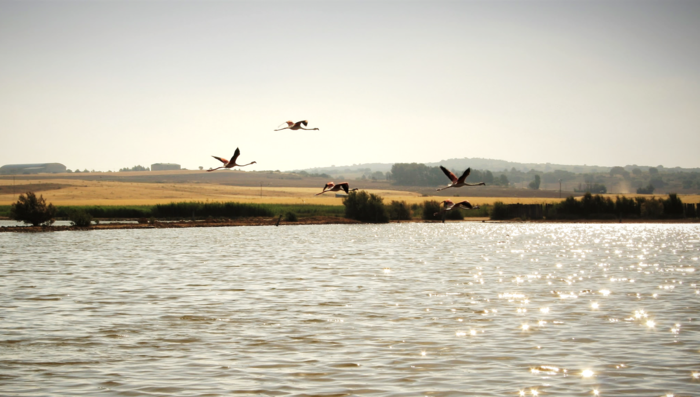Nicolas Valiente Parra, postdoctoral fellow at CBA, has published a new study in the journal Science of the Total Environment about nitrate removal pathways in a highly saline lake.
News - Page 2
Centre of biogeochemistry in the Anthropocene's annual meeting happened last week, with many great talks and good discussions about future work.
Environmental sciences professor Armin Wisthaler replaces Rolf D. Vogt in the CBA leader group from October 2021.
CBA researchers returned to fieldwork in Ny-Ålesund at Svalbard, after a year marked by the pandemic.
CBA PhD student Camille Crapart just published new results from her work, shedding light on important processes in freshwater.
A new study recently published in the journal Water looked at the phosphorous eutrophication in the sediments of the water source of the megacity Tianjin. CBA leader group member professor Rolf D. Vogt is a co-author of the paper.
A new study recently published in Ecosphere looks at the long term resilience in microcrustacean communities.
CBA welcomes a new PhD student to the project Permafrost4Life, Robin Benjamin Zweigel.
CBA PhD student Mohammad Javad Nematollahi and colleagues just published a new study in Environmental Science and Pollution Research.
CBA is one of the partners behind a new exhibition about changes in climate and nature at the Mountain Center in Lom opening June 24th.
Today, the Norwegian Research Council announced which applications are through to the second round for new Centres of Excellence. The CBA application for Centre for Arctic Climate Transitions is one of them.
CBA leader Dag O. Hessen is a co-author on a newly published study in Nature Climate Change on habitat changes in lakes caused by rising temperatures.
New research from the Borgå group led by Clare Andvik shows that new toxic chemicals can be transferred directly from mother to offspring in killer whales.
The last months, contributions to the Intergovernmental panel on climate change has been a main task for two CBA researchers.
Centre for biogeochemistry in the Anthropocene launches our annual report for 2020.
Download the report.
CBA centre coordinator Lene Liebe Delsett has launched a new book this week. It is in Norwegian and called Brennmaneteffekten – Hvordan går det med den norske naturen? (ENG: The Jellyfish effect – Is the Norwegian nature doing well?), published by Spartacus.
Ecological memory recognises the importance of previous stress encounters in promoting community tolerance and thereby enhances ecosystem stability, provided that gained tolerances are preserved during non-stress periods.
In a recent study in Marine Pollution Bulletin, Xue Lin and colleagues looked at the distribution and ecological risks of one plastic polymer (PET) and one phthalate plasticizer (DEHP) in the Jiaozhou Bay in China. CBA professor Rolf D. Vogt is one of the co-authors.
In a new review paper, researchers have summarized the evidence for Arctic climate change and the effects on the carbon cycle. They also re-evaluated some of the observational evidence for changing Arctic carbon budgets. CBA scientist Frans-Jan Parmentier is a co-author of the study, which was published in Current Climate Change Reports.
CBA chemistry professor Armin Wisthaler has been interviewed by Titan about his and colleagues' research about atmospheric chemistry.
Microplastic pollution has caused attention worldwide. One of the challenges when studying this type of pollution in soil and sediments, is to separate the microplastic particles from the remainder of the sample. A new study recently published online in the peer-reviewed journal Science of the Total Environment presents a possible solution.
Yesterday, CBA leader Dag O. Hessen won two awards in the major literature award, Brageprisen.
CBA researchers has co-authored a study on lakes now published in Scientific Reports. The results demonstrate a general increase in surface temperature in a global analysis of lakes, while a more variable and unpredictable change in deepwater temperatures. This has major implications for thermal stability and stratification, as well as responses in dissolved gases and thermal habitats for fish and other organisms.
Professor Marten Scheffer is a member of the scientific advisory board of CBA and gave a talk about transformation in society last week.
























